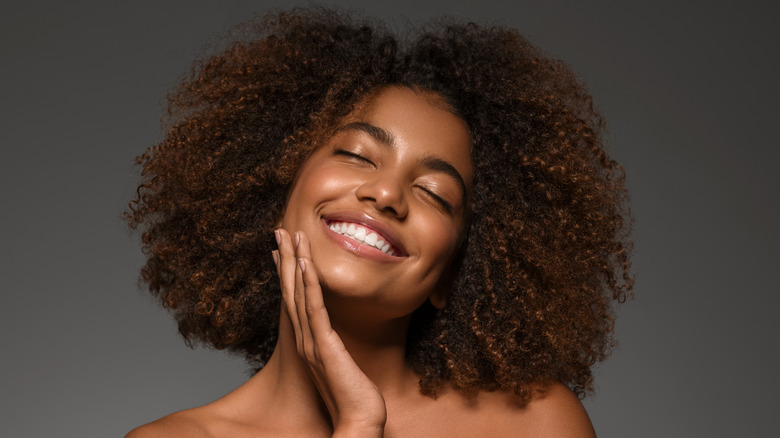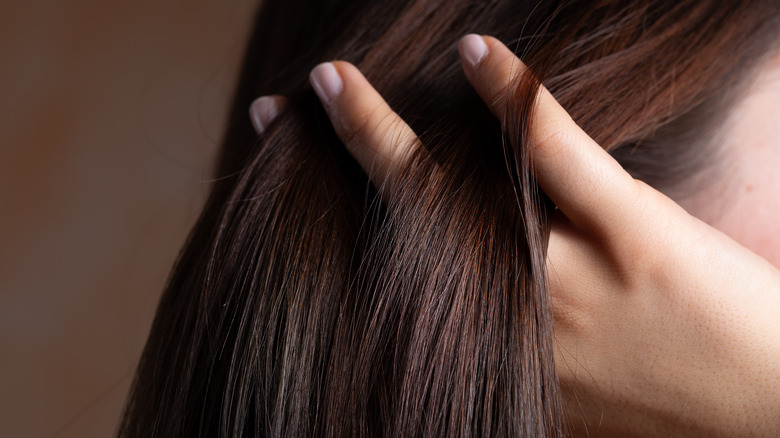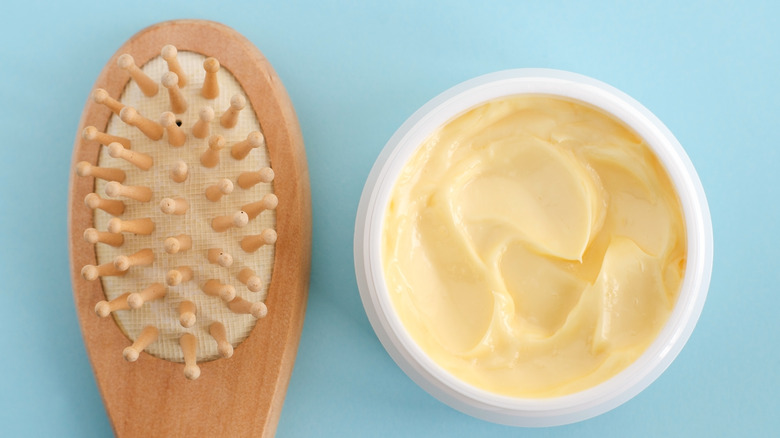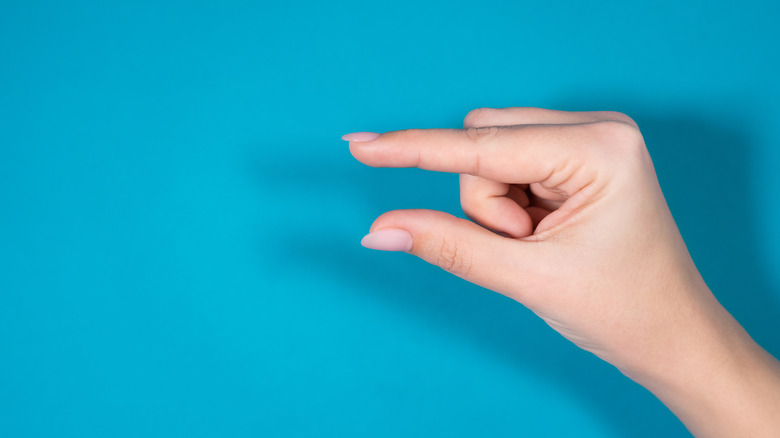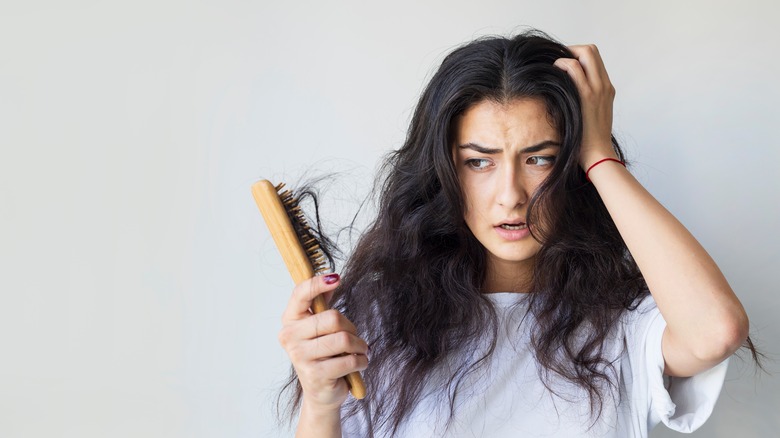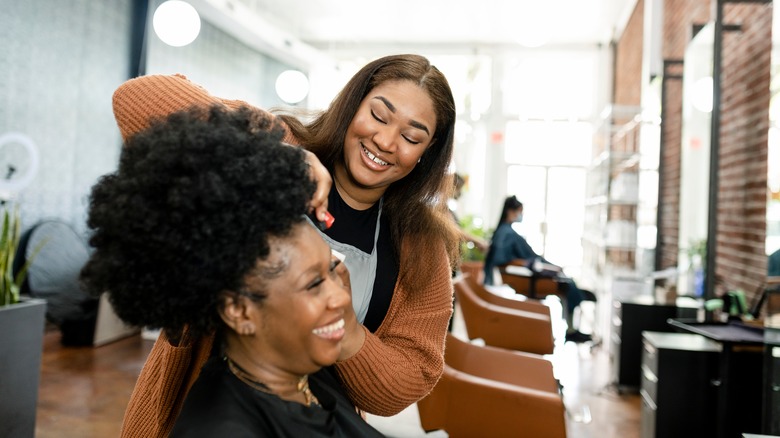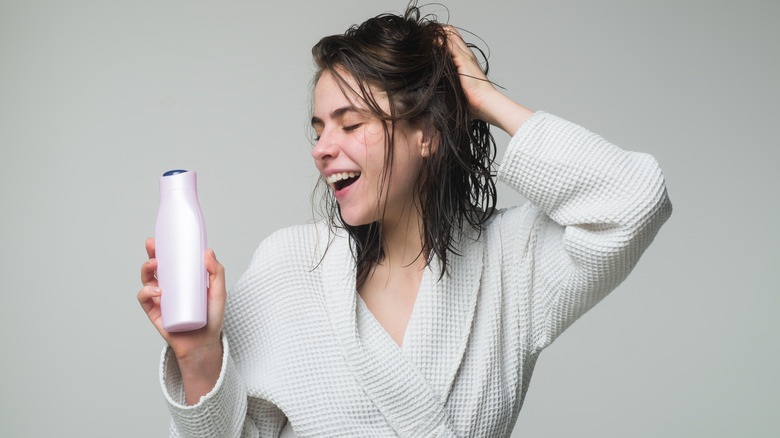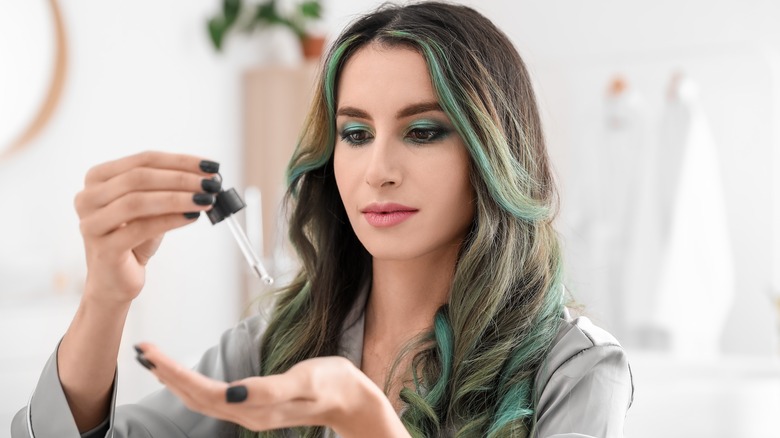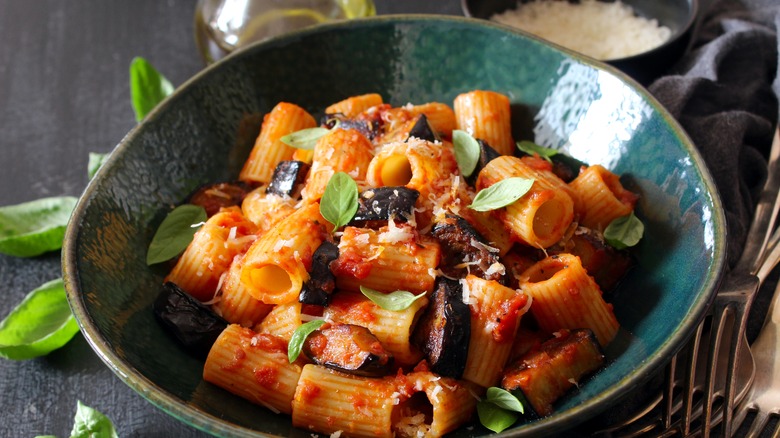Everything You Need To Know About Protein Treatments
If there's one thing that pretty much everyone can agree on, it's that we all want to have a head full of healthy hair. Well, according to the American Academy of Dermatology Association, you can encourage this by cleansing your scalp, conditioning your hair after every shampoo, and protecting your hair from chlorinated water. Additionally, Healthline recommends that you up your zinc and fatty acid intake and spend some time learning about your personal hair type and texture. Massaging your scalp, trimming your ends, and keeping the heat down on your styling tools can also be helpful. Naturally Curly also recommends applying protein treatments every four to six weeks.
As renowned American hair care brand Redkin explains, "Just like your body, your hair needs protein in order to stay healthy. ... Protein treatments boost the hair with a variety of nutrients and proteins to help reconstruct and strengthen hair strands."
Your hair is naturally made up of protein
Before getting into all things protein, let's first touch on what your hair is actually made up of. For starters, your hair consists of mostly protein that grows out of every hair follicle. According to Healthline, you've got around 100,000 hair follicles on your head alone and "between 85 to 90 percent of hairs are in the growth stage during a given period." As far as whether your hair is actually dead or alive, the short of it is: the hair that you can see is dead while the part that you can't see (the part that's in your hair follicles) is alive; this is why you're able to cut your hair and not feel any pain (via Healthline).
Your hair is made up of a protein called keratin. According to Healthline, your hair, skin, and nails contain a large amount of this substance. And in order for your hair to remain healthy, there will be times when you'll need to supplement your system by eating foods that are rich in protein or using protein treatments.
What is a protein treatment?
Protein treatments work by improving the elasticity of your strands. They also reduce breakage and split ends, protect hair from damage (including damage from chemical processing), and strengthen your hair follicles (via Byrdie). While most hair experts agree that a routine protein treatment is beneficial for everyone, people who typically need it the most are those who have dry or color-treated hair or individuals whose hair has high porosity (which means that although it can easily absorb products, there are "gaps" in the cuticles that can make it hard to retain them.
As far as the kind of protein treatments that you should use, you can either book an appointment with a stylist and have a professional protein treatment, or you can opt to apply one yourself. Allure recommends 11 protein treatments specifically for natural hair, many of which are extremely affordable and easy to apply at home.
Signs of too little protein in your hair
If you want healthy hair, you're going to need to make sure it has enough protein. According to Carol's Daughter, amino acids form together to make protein, which is essentially your hair's foundation. If you don't have enough of these acids, your hair could end up looking stringy or limp or feeling dry and brittle. Sticky-feeling hair can also be a sign that your hair needs more protein. "Typically, when the hair feels gummy or sticky, it means that your hair's internal support system is pretty damaged," Redkin explained. "This can happen if your hair is chemically processed too frequently or your hair has suffered an excessive amount of damage." These are all causes for concern because breakage and damage lead to hair loss.
If you happen to notice that your hair is shedding more than usual (for the record, shedding between 50 and 100 hairs a day is considered normal), take that as a sign to get a protein treatment.
Signs of too much protein in your hair
Just as it is possible to have too little protein in your hair, you can also have way too much of it. A clear indication that this is taking place is you've suddenly noticed that the texture of your hair has changed. If your hair looks or feels stiff, it could have too much protein. Two other indications of protein overload are split ends and increased breakage (via Carol's Daughter). Additionally, hairstylist Matt Newman told MindBodyGreen that too much protein can make your hair difficult to detangle.
But just how can you end up with an excessive amount of protein? It's usually the result of constantly using products that are formulated with a high amount of protein. Or, it could be that you have forgotten to keep your hair moisturized, which is "key to balance out the protein," according to Carol's Daughter.
What you can do to remove excess protein from your hair
Think your hair has too much protein? Don't panic because, luckily, there are a few things that can help. According to Healthline, one of the most effective ways to remove protein from your hair is to simply wash it with a clarifying shampoo. This works because the shampoo is able to break apart the bonds of protein that are attached to your hair. You can also apply essential oils, such as peppermint and lavender, to your scalp. They're great because they cleanse your scalp and may increase blood circulation to your scalp so that your hair can grow at a faster rate.
Finally, you can always head to the salon and have your ends trimmed. Since they are the oldest part of your hair, they probably have the most protein-related damage; removing them can get you on the path to healthier hair.
What you should do following a protein treatment
When you add more protein to your hair, that protein reinforces the bonds so that your hair remains strong. Moisture, on the other hand, hydrates your locks so that your hair feels softer and more manageable. You need both of these things to happen for your hair to be considered healthy (via Byrdie). That's why it actually makes a lot of sense that your hair would need to be deep conditioned after you treat it with protein.
As Precious Rutlin, trichologist and founder of Help Me With My Hair, told Byrdie, "You cannot have one without the other. This is why you see some people have brittle and damaged hair. ... If you don't moisturize, you run the risk of brittle, damaged hair, which is exactly what you're trying to fix or prevent in the first place."
Make it a point to deep condition your hair not just after a protein treatment but on every wash day too (via Naturally Curly). The moisture, along with the protein, will help your hair to flourish.
Other ways to provide your hair with more protein
Aside from putting a protein treatment on your hair, you might also wonder if there are other ways to give your strands the protein that they need. Thankfully, there are. According to Naturally Curly, giving yourself regular scalp massages with some sweet almond oil (which is rich with protein, per Healthline), pampering your locks with an almond milk rinse on wash days, and even using a little bit of coconut oil from time to time can add some protein to your hair without the need for any chemicals that may be in some commercial protein treatments. Naturally Curly also recommends whipping up a homemade protein treatment with a little bit of Greek yogurt, honey, avocado, and egg.
In your effort to supply your hair with all of the protein that it needs, just make sure that you don't overdo it. Too much protein, as you've learned, can wreak absolute havoc on your locks.
High-protein foods work in much the same way as protein treatments
Protein is largely responsible for building your cells, supporting areas of your body, like your immune system, and aiding body movement, according to Healthline. Not only that but protein also increases muscle mass, helps to strengthen your bones, boosts your metabolism, lowers your blood pressure, and helps you to maintain a healthy weight (via Healthline).
Since most of your hair's growth and development happens inside of your hair follicles, it's important that you make sure your diet consists of a healthy amount of protein. As registered nutritionist Jo Lewin explained in an article for BBC GoodFood, "If you are not consuming enough protein in your diet, your hair is likely to become dry, brittle and weak." She continued, writing, "Extremely low protein diets may result in restricted hair growth and even hair loss."
If your diet is lacking in the protein department, consider eating more beef, eggs, salmon, chicken, pasta, lentils, or peanut butter (via Eating Well). Some fruits can even help you up your protein intake, including protein guava, avocados, blackberries, apricots, bananas, cherries, and grapefruit.
